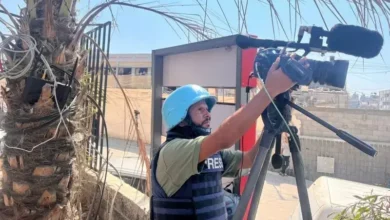South Africa, Hamas, Hezbollah terror nexus: Report

The Institute for the Study of Global Antisemitism and Policy (ISGAP) released a landmark report revealing the extent of the ruling political party in South Africa African National Congress (ANC)’s deepening ties with international designated terrorist organizations and their state sponsors, including Hamas, Hezbollah, Iran, and Qatar. Entitled, South Africa, Hamas Iran, and Qatar: The Hijacking of the ANC and the International Court of Justice, the report sheds light on how the alliance of terror and radical Islam are using South Africa and the people’s valiant historical legacy of struggle, as a critical node in global terrorist financing networks.
Crucially, the report connects South Africa’s political and financial alignment with Iran and Qatar—both leading supporters of global terrorism—with its campaign to bring a legal case against Israel at the International Court of Justice (ICJ). The ANC’s decision to pursue this legal battle appears to be part of a broader geopolitical strategy orchestrated by these terror-linked states to undermine Israel under the guise of international law. The report illustrates that this legal action is intended to mask South Africa’s domestic challenges while allowing Iran and Qatar to push their anti-Israel agenda using South Africa’s historical image of social justice as a convenient front.
The ISGAP report provides well-documented, evidence of the ANC’s support for Hamas, marked by formal agreements and frequent high-level engagements between ANC leaders and Hamas officials. In a disturbing trend, South African organizations purportedly engaging in humanitarian work have actually channeled financial and logistical support to Hamas and also Hezbollah, solidifying these dangerous ties.
Dr. Charles Asher Small, Executive Director of ISGAP, said: “This report underscores how South Africa’s leadership, under the ANC, is aligning with some of the world’s most dangerous actors, based on a culture of corruption. This marks an abandonment of the of the ANC core values under the leadership of Nelson Mandela, Oliver Tambo and Walter Sisulu who were committed to establishing a democratic South Africa for all South Africans. The ANC’s alliances with Hamas, Hezbollah, Iran, and Qatar not only destabilize the region but also position South Africa as a key player in the global web of anti-democratic terror financing. The decision to bring a case against Israel before the ICJ must be seen in this broader context, where international terrorism and political manipulation converge, in which these Jihadist entities attempt to delegitimize Israel in order to destroy it and to undermine democracy and related institutions, It is incumbent on the international community to take a strong stance against the ANC’s troubling partnerships with terror-linked states and organizations and expose the moral and political rot that endangers South Africans and all people committed to democratic principles”.
The report raises concerns about the timing and financing of South Africa’s case against Israel at the ICJ. It highlights how, in early 2024, shortly after the South African government announced its case against Israel, the ANC mysteriously managed to stabilize its finances with an influx of money, despite being on the verge of bankruptcy. This sudden financial turnaround came without explanation, raising suspicions of foreign financial influence, potentially linked to Iran and Qatar, as this occurred after high-level meetings with Hamas, Iranian and Qatari leaders with ANC ministers , both of which have vested interests in challenging Israel on the global stage.
Beyond that, the report raises critical flaws in South Africa’s case at the ICJ. This notably includes the lack of any mention of Hamas’ crimes, such as their use of the civilian population in Gaza as human shields to maximize collateral damage, or that the Hamas Charter and leaders consistently call for the dismantling of Israel and the murder of Jews around the world. The report also exposes the nature of the South African legal team at the ICJ, which is composed of individuals and organizations with a record of vehement anti-Israel bias, and direct links to terror organizations.
The report also brings attention to South Africa’s strategic partnership with Iran and Qatar, both of which have been implicated in supporting terrorism. South African government plays a critical role in facilitating Iran’s entry into the BRICS group of nations, thereby granting the country enhanced political legitimacy and access to an influential economic bloc. Similarly, Qatar’s influence in South Africa has grown significantly, particularly through substantial investments in the energy sector and close collaboration on international political issues, including the Palestinian cause.
Significantly, the report also discusses Russian financial influence in South African politics. It details how the United Manganese of Kalahari (UMK), partly owned by sanctioned Russian oligarch Viktor Vekselberg, has become a major ANC donor. Despite U.S. sanctions against Vekselberg for supporting Russia’s invasion of Ukraine, he retains substantial ownership in UMK, allowing him to continue financing the ANC. This raises serious questions about potential Russian leverage over South Africa’s foreign policy, especially regarding its increasingly anti-Israel stance.
The report also demonstrates how South Africa has become a strategic hub for terrorist financing, with sophisticated networks funnelling money to groups like Hamas and Hezbollah. Using systems such as hawala, these groups benefit from South African infrastructure, often with the tacit approval of local authorities.
Furthermore, the report delves into a classified South African intelligence document from 1998 that highlighted the already growing presence of radical Islamist organizations within the country, including Hamas and Hezbollah. These groups, it said, use South Africa as a base for fundraising, media operations, and even military training. This disturbing trend has only intensified, with the ANC’s leadership continuing to deepen its ties with these actors.
The report urges the international community to reassess South Africa’s role in global security and calls for a stronger stance against the ANC’s troubling partnerships with terror-linked states and organizations. ISGAP emphasizes that South Africa’s aggressive legal campaign against Israel appears to be part of a broader strategy to deflect attention from the ANC’s domestic crises, including widespread corruption and economic failure.



